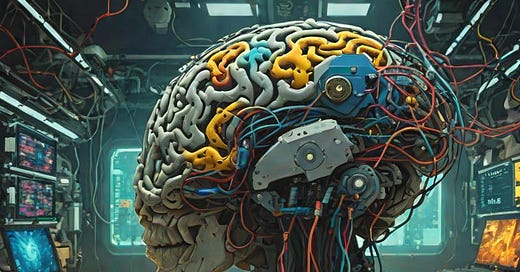Elon's brain chip implant is rolling out and the consequences will blow your mind
Here's a concrete example of what I mean when I say people become more like machines as the machines become more life-like
A couple years back, I came across a short article published in Time way back in 1956 with the cryptic title "Biocontrol".
It opens thus:
A familiar horror of science fiction is the slave whose thoughts and actions are governed by an electronic gadget grafted into his brain. There might be some truth in this fiction, says Electrical Engineer Curtiss R. Schafer, who designs and develops electronic instruments for the Norden-Ketay Corp. of New York City. Electronics, he believes, could save a lot of work for the indoctrinators and thought-controllers of the future.
The more things change, and so on.
If Curtiss R. Schafer’s proposition doesn't send a chill up your spine, you haven't watched enough Star Trek episodes with the Borg.
At least the Eisenhower era had the good sense to name the brain-chip as the horror it is.
Today, in the vaunted echo-chambers of the Great Online, the prospect of merging man and machine promises paradise on Earth. Few understand that there are infinitely more ways that it goes hellishly wrong.
Why is this so hard to see?
Here's my quick stab at an answer.
Technology is more than the gadgets that we build and the instruments we use to extend our natural capabilities.
Before we ever build any of our widgets, technology’s essence is a way of seeing, grasping, and comprehending What Is and What Matters.
If you know your philosophical jargon, technology provides us with an ontology and an ethics. It's how we make sense out of things and understand what is most important to us.1
You know what used to do that for us? Religion and myth.
I know, I know. Let me "ackshually" myself and get it out of the way:
"Matt, you're all backwards. Technology and science showed us the truth about nature. Myth is just backward superstition and wishful thinking."
Yeah. I used to believe that too. I know the arguments inside and out.
Matters are not the way you've been told. I'll get to that below.
First I submit to you the trigger for this article.
1. When technology became myth (and myth ate technology)
Laughing-face emoji aside, this Xeet is but a razor's width away from beliefs that many people earnestly hold.
Technology's essence, considered as a total worldview, did replace myth as the organizing principle of our society.
What few recognize is that by absorbing myth technology became a myth.
Humans believe in transcendent values. That can't be avoided any more than we avoid growing hair or digesting food. If we don't make those values explicit, as religion and myth did, then we'll find substitutes—even if we can't call them what they are.
We're in an awkward position where there is no distinction between technology and myth.
In the absence of thick and meaty myth, the unmoored psyche opts for the nearest substitute.
Substitutes such as turning our technical know-how into an object of worship, and drawing (perhaps unserious) religious parallels with technology's public face.
I've discussed this matter at tedious length elsewhere. No matter, here's a brief refresher.
2. Replacing the what for with the how come
The modern scientific outlook tells us firmly that nature contains no intrinsic purposes of its own.
Everything from the motion of physical objects to the evolution of complex life can be fully explained without appealing to the intentions of a designer.
Philosopher Daniel Dennett likens the situation to asking "Why?" and looking for two different answers.
One answer to Why? offers a "What for?" response. The question asks for a justification. Why did the serial killer stab those prostitutes? We're looking for a reason, a purpose, any sort of conscious motivation to answer why he did what he did.
With disturbed minds, we see clearly a point that isn't always obvious in ordinary life. He may have no conscious motivation to give.
There is a reason why the killer did what he did, and that reason has no connection to his intentions. This is the step where the psychologists and neuro-science people will talk about the unconscious mind, or better yet, hidden causes in the brain.
Causes ranging from repressed childhood trauma to poverty to a cancerous tumor pressing on the frontal cortex explain why the killer kills.
This, says Dennett, is the other way to answer Why?
Instead of responding with a person's intention, the scientific approach reports the chains of causes and effects that explain how the events came to pass.
Instead of "What for?" we answer with a "How come?"
Spend a moment to meditate on what this means. If we can explain deviant behavior by discovering the hidden causal processes in an organism, then there's no barrier to explaining all thoughts, feelings, and behaviors, even in you healthy normals.
We don't need to ask about your purposes or intentions for doing what you do. There's an answer for that inside your brain.
Why is all How.
You might wonder what this digression has to do with anything. Wait no more. Here's why this is a most serious problem.
3. The collapse of the separation of Tech and Myth
So far we've seen how technology becomes its own myth, and how the key to that myth is the replacement of "what for" purposes with "how come" causal explanations.
You may not believe me, but I bring no serious objections to the superficial use of "technology" implanted in human bodies. The actual gadgets and doo-dads are a distraction from the deeper problems at hand.
We aren't talking about reactionary "Luddite" rage against the machines for simply existing. I remind you that it is the outlook, the worldview, the Weltanschauung that is our white whale.
The problem is thus:
We no longer have any meaningful line dividing myth from technology.
When we can't tell the difference, technology absorbs myth, and myth absorbs technology.
Every institution from the family to law to politics and ethics is built on the “what for?” Technology’s “how come?” can't answer questions about what's worth doing (and what is not). There’s no “what for?” on the table. The only relevant question is, How can we do it?
That position, which a shocking number of people alive and working in these fields really believe, is built on—what else?—value judgments.
Only there is no vocabulary to call them by that name.
You, reader, are nothing more than densely-layered and nested systems of causal processes trucking away inside your skin, which includes all the magic happening inside your skull.
“How come?” leaves us no guiding values or purposes that tell us what to do with the flesh-bags—or, more to the point, what shall not be done to them.
Curtiss R. Schafer connected the dots for us back in 1956:
A few months after birth, a surgeon would equip each child with a socket mounted under the scalp and electrodes reaching selected areas of brain tissue. A year or two later, a miniature radio receiver and antenna would be plugged into the socket. From that time on, the child's sensory perceptions and muscular activity could be either modified or completely controlled by bioelectric signals radiated from state-controlled transmitters. The regular treatment for schizophrenia uses the same surgical techniques... The electrodes cause no discomfort, no damage to brain tissue and no interference with the functioning of the brain except when energized.
At least they want to use it to treat disabilities and diseases. It's a therapeutic medical treatment. No way they’d hook this thing into your skull and make sure you thought only good thoughts without misinformation.
For your own good.
The once-human being, thus controlled, would be the cheapest of machines to create and operate. The cost of building even a simple robot, like the Westinghouse mechanical man, is probably ten times that of bearing and raising a child to the age of 16.
This is what nerd-ethics gets you.
Our favorite info-tech industrialist is creating Schafer's biocontrol dream as we speak, using implanted machines to read and write to human brains.
I don't need to fill in the rest. Your own imagination is doing the work for me.
Before you get out of here
If you found this article valuable, interesting, funny, or it made you upset that you had to use your mind for something besides infinite scrolling, pass it along 👇
Thanks for reading.
Matt
Yes, that’s my Heidegger showing.





